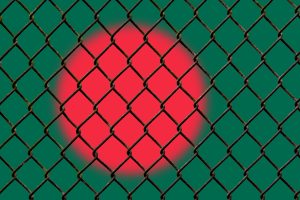Over the past decade, Bangladesh’s booming economy has outpaced its regional counterparts, yet parallel to that growth is an alarming decline in people’s rights coupled with authoritarian measures that threaten the country’s newfound development. As Prime Minister Sheikh Hasina seeks to solidify her party’s rule in the lead-up to elections on January 7, the international community must look beyond economic scorecards and consider that sustainable growth is jeopardized without fundamental freedoms.
As Bangladesh grows its middle class and rises from the United Nations’ “least developed country” category, authorities routinely subject members of the press to arbitrary detention, protracted legal harassment, surveillance, and even alleged torture in state custody in retaliation for their work. Near complete impunity persists in cases of killings, abductions, and violence against members of the press. Journalists, whose daily reports are the lifeblood of information flows that make dynamic economies possible, risk being silenced in an amplified government crackdown while the public’s and markets’ right to accurate and reliable information – a critical component of good governance – is under threat.
Since Hasina and her Awami League party emerged victorious in the 2008 national poll, subsequent elections have been marred by deadly clashes and reports of ballot stuffing, voter intimidation, and ruling party control of polling locations. Ahead of the upcoming election, Bangladeshi police procured large shipments of ammunition, tear gas shells, and sniper rifles amid expectations of surging violence. In recent months, dozens of journalists have been attacked while covering political rallies, as well as alleged electoral misconduct.
Ahead of the previous national election in 2018, the government blocked 54 news websites on vague “national security” grounds and shut down 3G and 4G internet services, obstructing information flows and the media’s ability to work effectively. Journalists faced arrest and investigations for reporting on alleged ballot irregularities, in addition to physical attacks and denial of access to polling centers by ruling party members. The result: self-censorship.
The U.S. government has seemingly taken note of Bangladesh’s history surrounding elections by announcing a policy to restrict the issuance of visas for any Bangladeshi individual involved in “undermining the democratic election process,” including those engaged in preventing the media from publishing critical commentary.
Bangladeshi authorities are systematically stifling local independent media in the run-up to the election. In what was widely seen as an attempt to undermine the reputation of the country’s leading national newspaper, Prothom Alo, authorities arrested correspondent Shamsuzzaman Shams in March. Twelve days following Shams’ arrest, in a parliamentary speech, Hasina labeled Prothom Alo, which has been critical of the government, as an “enemy” of Awami League, democracy, and the people of Bangladesh.
Prothom Alo special correspondent Rozina Islam, who was arbitrarily detained for seven days in 2021 in apparent retaliation for her reporting on alleged government corruption, faces an ongoing investigation opened under a colonial-era law that can carry a death sentence upon conviction. Her passport remains in judicial custody, impeding her right to travel freely.
Shams, who was released on bail, and Prothom Alo editor Matiur Rahman regularly appear in court for proceedings under the Digital Security Act (DSA), a draconian law that criminalizes several forms of free expression online. The DSA has been widely used against Bangladeshi journalists, with over 400 cases filed against journalists since its enactment in 2018, according to the Dhaka-based Center for Governance Studies.
Journalists facing DSA investigations have also alleged torture and disappearance. Meanwhile, justice is elusive for writer Mushtaq Ahmed, who died in jail in 2021 following over nine months of pretrial detention under the DSA and alleged electrocution in state custody. Even family members of exiled journalists have been targeted under the DSA in an apparent effort to muzzle critical reporting abroad.
The government has attempted to assuage concerns surrounding its human rights record by replacing the DSA with a new Cyber Security Act, enacted in September. In reality, the new law simply repackages the repressive sections of the DSA used to create a pervasive culture of fear within the media and critics alike. Furthermore, DSA cases will not be withdrawn despite the new law.
The upcoming election presents a unique opportunity for Bangladesh to demonstrate improvement of its abysmal press freedom and human rights record. Rather than solidifying its efforts to criminalize journalism deemed inconvenient, Bangladesh should protect the media’s right to operate freely and independently, and ensure accountability for abuses against those keeping the public informed on the issues that matter most.
Governments invested in democracy and sustainable growth should partner with Bangladesh to ensure media freedom is prioritized, starting with election reporting free of violence and interference – the hallmark of a democratic electoral process that instills public trust desperately required for Bangladesh’s political reset.































